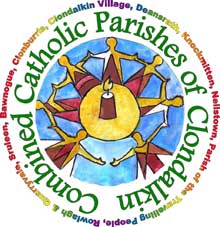Getting Married?
Congratulations on your engagement. The Parish Team are delighted for you and happy to assist you in preparing for your marriage. The following points outline some things the couple need to attend to so as to ensure that your preparations and plans for marriage in the Church run smoothly.
1. Arrange your wedding date with the Church. As soon as you can you should contact the Parish Office to arrange and confirm a date and time for your marriage with the Church. Please do this before you confirm a booking for your wedding reception as the Church may not be available on the day you wish to have your wedding. In the Archdiocese of Dublin, Church weddings are not permitted on Sundays, Holy Days, in Holy Week and on certain other days throughout the year, e.g. Ash Wednesday. The Parish Pastoral Council has asked that, in addition to the offerings for the priest and sacristan on the wedding day, couples should contribute a church offering of €150 which should be paid in full at the time of booking their wedding date in the Church Diary. Couples who do not live in Clondalkin parish, but who wish to use the Village Church or Knockmitten Church for their wedding, should contribute a church offering of €250 which should be paid in full at the time of booking their wedding date in the Church Diary.
2. Civil registration. So that the Irish State will recognise your marriage, all couples getting married in Ireland, whether in a religious, civil or secular ceremony, must comply with the regulations set out in the relevant legislation. Couples are required to give at least three months notice of their intention to marry to the Registrar of Marriages. This must normally be done in person and you will need to make an appointment to meet with the Registrar for this. See www.civilregistrationservice.ie for information on marriages and making a notification appointment with a Registrar of Marriages. When you complete the notification process the Registrar will issue the couple with a Marriage Registration Form (MRF) which you must bring to your wedding ceremony. The MRF is signed immediately after the marriage ceremony has taken place and the couple must return the signed MRF to the Registrar in order for their marriage to be registered with and recognised by the Irish State.
3. Church Paperwork. In addition to the civil registration requirements mentioned above, every person intending to marry in the Catholic Church must complete a Pre-Nuptial Enquiry form. This is normally done three to six months before the intended wedding day. The Pre-Nuptial Enquiry is usually completed with the priest in the parish where the person is currently living. In certain situations, it may be appropriate for a priest in the home parish or the priest celebrating the wedding to complete the Pre-Nuptial Enquiry form. Check with the Parish Office or contact one of the priests to ascertain who is best placed to complete your Pre-Nuptial Enquiry form.
4. Documents required by the Church. Certain documentation must be provided by each person to complete their Pre-Nuptial Enquiry form:
- A recently issued Baptismal Certificate from the Church where you were christened, dated within 6 months.
- You may need a Confirmation Certificate from the Church in which you were confirmed if the fact of your Confirmation is not included on the Baptismal certificate. (It usually is).
- You will need to establish your Freedom to Marry. There are several ways of doing this. The priest completing your paperwork will decide with you the most appropriate way for you to do this when you meet with him.
5. Preparing together. Making the decision to get married is a significant moment. Like any important commitment we undertake, preparation is essential. Marriage preparation courses help couples reflect on various aspects of their relationship and encourage conversation between the couple. The Parish recommends pre-marriage courses run by Accord, the Catholic Marriage Care Service. See www.accorddublin.ie for further information on the content of marriage preparation courses. You can book your pre-marriage course online through the Accord Dublin website or you can contact Accord Dublin by phone at 01-4780866.
Diocesan Statement on ‘Avalon’ DVD
Many parishes have been contacted with information regarding a pre-marriage DVD course being marketed by Avalon RC Limited. The information and the Avalon website suggest that this course meets the “Bishops’ Guidelines”. This DVD course and online questionnaire cannot meet the Irish Episcopal Conference Criteria for Courses of Preparation for the Sacrament of Marriage and is not an acceptable course of marriage preparation in the Archdiocese of Dublin.
6. Preparing for the Ceremony You should consult with the priest who will celebrate your wedding ceremony or your local priest for advice and support in preparing for your wedding. There are many good resources available to help with choosing the Scripture readings and prayers for your wedding ceremony. You will also need to choose appropriate music and hymns for the ceremony. As the wedding day draws nearer, you may wish to arrange a wedding rehearsal with your priest and make any arrangements necessary for flowers and decoration of the Church.
